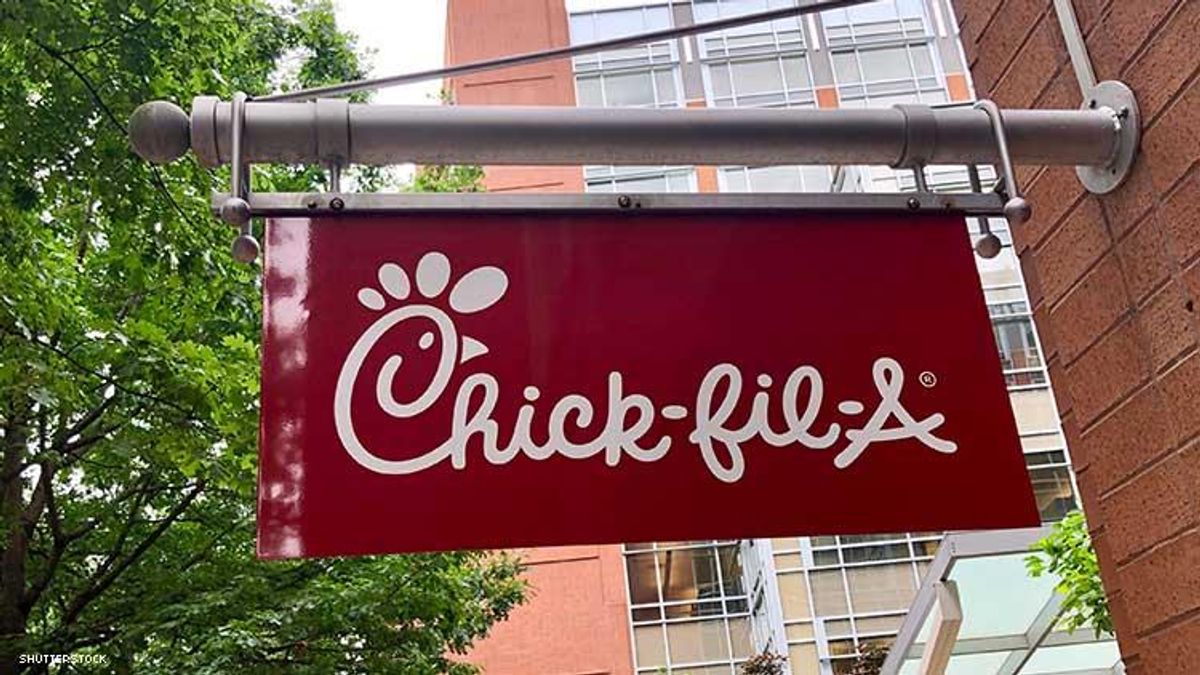Voices
Your Dollar Is Your Power, Even When It Comes to Chicken

Sorry, Chick-fil-A ... your chicken still tastes like hate.
Jonathan Lovitz
November 21 2019 2:04 PM EST
May 31 2023 6:40 PM EST
By continuing to use our site, you agree to our Private Policy and Terms of Use.

Sorry, Chick-fil-A ... your chicken still tastes like hate.
Many of us have attended happy hours that lasted longer than Chick-fil-A's supposed change of heart in regard to corporate donations that harm the LGBTQ community. Faster than you can say, "May I take your order?" the fast-food restaurant was backpedaling and caving to conservative voices who said the chain of subpar chicken capitulated to so-called liberal voices.
What Chick-fil-A did, in fact, was underscore that the LGBTQ community and our allies must be ever more vigilant with our dollars -- checking carefully where we spend them, and where those dollars ultimately go.
Let's be very clear about what Chick-fil-A supposedly did by saying (momentarily) that it would no longer support "charities" that are known to stand against LGBTQ and other minority communities; it was not change that should be lauded. At all. After decades of intentionally hurting our community, real change would be taking that money and using it to fight for LGBTQ and other diverse communities. For example, the money spent on the transphobic Salvation Army should be doubled to lifesaving organizations like the Trevor Project if they want us to believe this isn't the PR farce it has turned out to be.
I have worked with dozens of companies who have earned the loyalty of the LGBTQ community by doing right -- not just by saying they'll avoid doing wrong.
Thankfully, the power of LGBTQ brand loyalty has moved many of the businesses we all know and love to far more authentically represent our community in its marketing and advertising. And for good reason: More than 75 percent of LGBT adults and their friends and relatives would switch to brands that are known to be LGBTQ-friendly. In 2017 alone, the LGBTQ consumer buying power was over $917 billion, a spending power that rivals the disposable income of other American minority groups. Couple that with the $1.7 trillion that LGBTQ business owners and job creators add to the GDP every year, and the community is quite the force with which to reckon.
The timing of this whole chicken kerfuffle is poignant. We are all on collective pins and needles awaiting the outcome of the Supreme Court cases that will decide if LGBTQ Americans are entitled to protections in the workplace and public accommodations. We know where companies like Chick-fil-A fall on the spectrum of support for Title VII being read as including sexual orientation and gender identity. But even their most ardently conservative bottom-line watchers must know how the kind of state-sanctioned discrimination they endorse with their donations will have a catastrophic effect on their business model.
Just look at the many airports and universities refusing to permit Chick-fil-A to open new locations on their premises. They know that associating with a brand that so openly disavows entire segments of the population has permanent repercussions on their ability to attract and retain customers. There will also be major economic damage in localities that don't stand up and say that discrimination on Main Street is wrong. The billions lost by the state of North Carolina while it promoted its anti-transgender "bathroom bill" will be a drop in the bucket against the total tax revenue, industry growth, and innovation lost in places that would now allow the marginalization and exclusion of fellow Americans. Local economies succeed only when there is a fully engaged and protected workforce and supply chain, free from fear and discrimination.
But perhaps most frightening among the implications in both the Supreme Court cases being decided -- and the proxy battle to divide the country into pro- and anti-LGBTQ factions that Chick-fil-A underscores -- is that we could be facing an assault on all American minorities under the facade of "religious liberty." In recent months we have seen unprecedented cooperation and solidarity between our nation's diverse communities. Too often conversations about LGBTQ rights ignore the essential fact that we include women, communities of color, people with disabilities, immigrants, veterans, and so many others who could be further marginalized if this case ushers in a new era of exclusion. If companies that donate in the way Chick-fil-A does get their way, it could soon be perfectly legal for businesses with religious objections to make second-class citizens out of any community, religion, or nationality with which its management may disagree.
Remember, not all chicken nuggets taste the same. Some taste like they hate you. And why on earth would you give such a company your hard-earned dollars?
Use the LGBTQ community's trillion-dollar clout to make a difference. Support your community when you shop, seek out LGBTQ-owned businesses when you invest, and stand by those who stand with us. The Human Rights Campaign and other organizations make it easier than ever to find those earning top marks for supporting and investing directly in our communities. Money talks. And now, more than ever, the private sector is listening to the collective voice of the LGBTQ community. In many ways, our dollar is as strong as our votes at the ballot box. So when it comes to chicken -- and everything else -- follow the money and be sure it's finding its way back to helping all of us succeed.
Jonathan Lovitz is a nationally recognized LGBT and public policy advocate, also currently serving as the senior vice president of the National LGBT Chamber of Commerce (NGLCC). Lovitz is a regular commentator on MSNBC, CNBC, NPR, The Advocate, and Bloomberg, among others. Follow Lovitz on Twitter @jdlovitz.